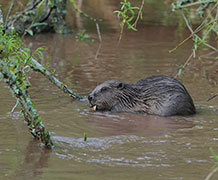
Professor Brazier's team is working closely with project partners to understand the impacts of reintroducing beavers to wet woodland sites. Image courtesy Dave Land
Exeter team to monitor impact of wild beavers on our waterways
A team at the University of Exeter is to study England’s only breeding population of wild beavers in order to understand their impact on pollution, flooding and water quality after an announcement yesterday.
Professor Richard Brazier, a hydrologist at the University of Exeter, will lead the research into the effects that the beavers have on the water resources of the River Otter, specifically to understand the potential that this keystone species has to mitigate diffuse pollution, attenuate downstream flooding and improve water quality in the river.
Yesterday, Devon Wildlife Trust (DWT) was granted a five year licence to monitor the beavers by Natural England. The charity is welcoming the positive news after spending months of hard work trying to secure a long term future for the animals.
Professor Brazier's team is already working closely with the DWT and project partners to understand the impacts of reintroducing beavers to wet woodland sites, in a controlled experiment in mid-Devon.
He said: “Licenced reintroduction of beavers on the River Otter provides us with a unique opportunity to study this indigenous species in the wild. We will be able to build an holistic understanding of the way in which the beavers adapt the River Otter habitat to their benefit, in order to understand whether, as we suspect, their presence can also bring multiple benefits to society.”
The beavers, which live on the River Otter in East Devon, were first discovered to be breeding in February 2014. A beaver and kits were filmed on the River Otter, proof of the presence of the first breeding beavers in England for hundreds of years. Anecdotal sightings of beavers and beaver activity point to beavers being present on the river for three years or possibly longer.
Defra announced its intention to capture and remove the animals in July citing the risk to human health from a tape-worm that European beavers are known to carry, but which is not currently present in the UK. DWT has spent the last six months working with Defra, Natural England, local farmers and the wider community to secure a solution that would see the disease risk addressed and the beavers remain.
Harry Barton, Chief Executive of the Trust, said: “We are delighted by Natural England’s decision to grant us a licence to give these beavers a long term future on the River Otter. It’s the result of a great deal of effort by our charity, supported by partner organisations across the UK and, most importantly, by the local community. This is an historic moment. The beavers of the River Otter are the first breeding population in the English countryside for hundreds of years.”
Estimates of when beavers went extinct in England vary. Recent documentary and archaeological research by Professor Bryony Coles of Archaeology at the University of Exeter, suggests that remnant populations of beavers may have survived into the 1700s.
Natural England’s decision grants the DWT a licence to monitor the beavers for the next five years. The charity’s River Otter Beaver Trial will work with international experts to record and evaluate the impact of the animals.
Peter Burgess, the Trust’s Conservation Manager, led the licence application to Natural England. He explained what the project will mean: “This project will measure the impact that these beavers have on the local environment, on the local economy and on local people. The evidence from elsewhere shows that beavers should have an overwhelmingly positive effect, but this is the first time the animals will be living in a well-populated, agriculturally productive English landscape for hundreds of years. We need to ensure that any negative impacts of beavers are avoided. This will mean working alongside the Environment Agency, local authorities and landowners to manage any problems that may arise over the coming years.”
At present Natural England is yet to announce the full details of the licence.
As part of the licence the beavers will be briefly be brought in to captivity in order for health checks to be made. This process will be overseen by Defra with expert advice from leading zoological and beaver experts.
At the conclusion of the project in 2020 the River Otter Beaver Trial will present Natural England with its evidence. Using this information a decision will be made on the future of the beavers on the river.
The initial phase of monitoring by Professor Brazier’s team, over the first six months, will be funded by HEFCE through their HEIF scheme.
Date: 29 January 2015
